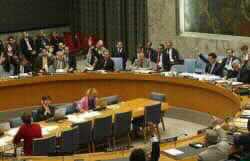The United States decided not to veto a Security Council resolution calling for Israel to withdraw from Palestinian cities, clearing the way for its passage early Tuesday and handing a diplomatic victory to the Palestinians. The resolution, which passed 14-0 with America abstaining, was negotiated by the European Union and cobbled together with language from competing U.S. and Arab proposals. "The resolution that we've adopted this evening was flawed in our view in that it failed to explicitly condemn the terrorist groups and those who provide them with political cover, support and safe haven in perpetuating conflict in the Middle East," Deputy U.S. ambassador James Cunningham said.
But the vote was a victory for the Palestinians and their Syrian backers on the 15-member Security Council.
Arafat spokesman Nabil Abu Rdeineh called the vote "a step in the right direction."
"I believe this abstention from the United States is a clear criticism of Israel and its actions on the ground and reveals their dissatisfaction with Israel and its measures."
Israel's U.N. ambassador, Yehuda Lancry, said the U.S. abstention should be seen in light of Washington's desire to preserve good international relations ahead of possible military action against Iraq.
"It's definitely a disappointment," Lancry told Israel Radio. "But with the complex American situation regarding the Iraqi issue and its desire not to further strain relations with its European partners, they preferred to take a position in the middle."
The Palestinians have failed several times to secure a resolution since violence broke out in the Middle East in September 2000. The United States, one of five permanent council members with veto power, blocked a similar Palestinian resolution in December.
The United States had threatened to do so again but ultimately abstained on Tuesday when some of the language it had sought - condemning terrorist attacks and bringing the perpetrators to justice - was inserted into the final text.
But the United States refused to approve the resolution because it failed to mention Israel's security concerns or specifically identify Hamas and Islamic Jihad as the two resistance man groups responsible for two deadly suicide bombings in Israel last week.
The original Palestinian draft blamed Israel for the upsurge in violence, demanded its withdrawal from Palestinian cities and expressed concern for the humanitarian plight of the Palestinian people.
It did not address Israel's security concerns or mention Palestinian suicide bombings. The ongoing siege of Arafat's compound was prompted by two such attacks last week.
The approved resolution "demands that Israel immediately cease measures in and around Ramallah, including the destruction of Palestinian civilian and security infrastructure."
It further demands "the withdrawal of the Israeli occupying forces from Palestinian cities toward the return to positions held prior to September 2000."
The resolution also "calls on the Palestinian Authority to meet its expressed commitment to ensure that those responsible for terrorist acts are brought to justice," and it reiterates a demand for the cessation of all acts of violence.
When it became clear late Monday that the Palestinians were going to push for a vote on their text, the United States submitted its own proposal to condemn the suicide bombings, name Islamic Jihad and Hamas as the responsible parties and call for the two resistance men groups to be treated as terrorist organizations under the provisions of an anti-terrorism resolution passed after the Sept. 11 attacks.
Using unusually harsh language to criticize Israel, the U.S. draft also expressed grave concern for Israel's actions at Arafat's compound which "aggravate the situation and ... do not contribute to progress on comprehensive Palestinian civil and security reforms."
But the Palestinians and their Arab partners on the Security Council rejected the American draft, setting off 10 hours of negotiations as France, Britain, Norway and Ireland worked to find a compromise.
Under pressure to act in the face of escalating death and destruction in the Middle East, the Security Council opened its chamber Monday to debate the crisis.
U.N. Secretary-General Kofi Annan asked both sides to reverse course in exchange for a peaceful solution to the 54-year-old conflict.
PHOTO CAPTION
The United Nations Security Council votes early Tuesday, Sept. 24, 2002, to adopt a compromise resolution on the Mideast demanding that Israel cease actions around Yasser Arafats West Bank compound while condemning resistance attacks. The U.S. abstained from voting on the resolution, negotiated by the European Union and based on competing proposals from the United States and the Palestinians. (AP Photo/David Kar
- Author:
& News Agencies - Section:
WORLD HEADLINES


 Home
Home Discover Islam
Discover Islam Quran Recitations
Quran Recitations Lectures
Lectures
 Fatwa
Fatwa Articles
Articles Fiqh
Fiqh E-Books
E-Books Boys & Girls
Boys & Girls  Women
Women










